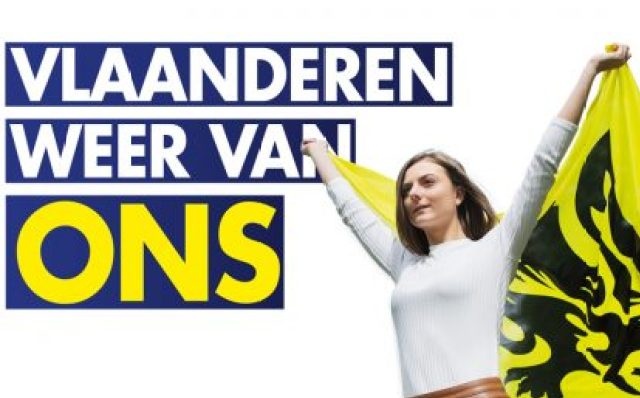A poster for Belgium’s radical right-wing populist party Vlaams Belang: “Flanders From Us Again”
Populist radical right parties have traditionally been the realm of men. Comparative studies have highlighted the underrepresentation of women, both in the parties and amongst their voters, and views on gender issues are more uniformly traditional than other parties on the right.
But is this always the outcome for right-wing populism and gender politics? One academic study argues that the “gender gap” is overstated and populists may have begun to “demasculinize” party programs. Examinations in Bulgaria and Slovakia found a focus on descriptive representation has obscured the substance of party work on women’s issues.
Let’s have a look through the role of gender in Belgium’s Flemish populist radical right party Vlaams Belang (Flemish Interest).
Identifying Women’s Activism
VB follows the pattern of radical right parties with significantly fewer women than men in its ranks. In 2010, only 32% of its members were women, the lowest of any Flemish party. Just over 1/3 of VB’s legislators are women, and its 12-seat executive board has only two women.
Asked about gender in the party, VB’s Federal Parliament group leader Barbara Pas argues:
I’ve always been a woman in a man’s world. I studied engineering and there the male-female ratio was a bit like in politics. It shouldn’t make a difference whether you are a man or a woman
But she acknowledges the constraints that weekend and evening-oriented work can put on women aspiring to political offices.
Instead, one study has found that women were more likely to engage in “private activism“, including signing petitions, boycotting products for political reasons, and donating or raising money. VB’s local party life is centered on each branch’s annual meal, breakfasts, barbecues, and family days.
An examination of Italy’s Lega and France’s Front National (now the Rassemblement National) found that women tended to refrain from referring to themselves as activists. They were more likely to see their skills and work as part of wider relational and emotional care work rather than as part of party activism. These private and informal roles in populist radical right parties, including VB, may be hidden from the eyes of political researchers.
Policy Moderation and Masculinity
Many radical right-wing populist parties have begun to position themselves as the protectors of women and LGBTQ individuals. For VB, this is played out in rhetoric arguing against the “Islamization” of Flanders. In an interview about his book — For Freedom, So Against Islamizaiton — the party’s leader in Antwerp, Sam van Rooy, asserted: “Girls and women who really choose this themselves suffer from Stockholm Syndrome and raise a middle finger to our free society and to all the girls and women who are daily oppressed by means of the Islamic veil.”
The VB are among the most prominent proponents of “homonationalism”, the incorporation of LGBT rights into predominantly Western understandings of the nation, premised on the exclusion of ethnic and religious “others” who are seen as threatening. Van Rooy claims, “I hear stories of young women, homosexuals and Jews who don’t dare to go to certain neighborhoods anymore…so we’ve already lost those neighborhoods to Islamic rules of behaviour. I want to fight that.”
Members of Vlaams Belang therefore portray themselves as defending Flemish societal norms, including gender and LGBT equality. So the VB adopts the language of social liberalism while simultaneously employing an othering discourse towards Muslims — and particularly Muslim migrants — which is typical of nativist ideologies. The party is the “masculine” protector of women.
The VB has adjusted its family policies over time. The party initially opposed divorce and pre-marital cohabitation, but it has begun to acknowledge difficulties in relationships, to arrange access to divorce and parenting support where necessary, and to promote women’s participation in the workplace. In 2019, the VB’s party program said “the family” should be “interpreted much more broadly than the classical family of the 20th century”.
There has also been a moderation in the party’s use of masculinized images. Boxing gloves and brooms (to “sweep away” the competition) have been replaced with families and nostalgic, idyllic pictures of Flanders to emphasize “social policies”.
Situating Populist Politics in a Man’s World
This negotiation of politics as a “man’s world” is not exclusive to the radical right populists. The VB’s nearest competitor, the center-right Nieuw-Vlaamse Alliantie (N-VA), has accepted non-traditionalist views on gender equality and LGBT rights in a “carefully managed” process of “evolution rather than revolution”.
Meanwhile, N-VA has only a slightly higher representation of women in local positions, with 39% as executive members compared to VB’s 34%. And in 2018, only 7% of N-VA branch leaders were women compared to 21% in VB.
N-VA leader Bart de Wever has echoed VB’s criticism of the veil, “Those same leftists who were lighting their bras on fire in May of 1968 are now embracing the veil as a symbol of equality…People want to destroy Christianity but accept everything when it comes to Islam.”
The conclusion, according to researchers Niels Spierings and Andrej Zaslove, “It appears that PRR [populist radical right] parties, with respect to sex and gender, are in many ways simply a more radical version of centre-right parties.”
Of course, the underrepresentation of women in these parties should be noted, but this underrepresentation does not necessarily set radical right populists apart from other right-wing factions. Treating the radical populists as abnormal does not lead to better research or better politics. Rather, it is gendered activism, policies, and images in populist radical right parties that provide a more nuanced view and a more considered response.

